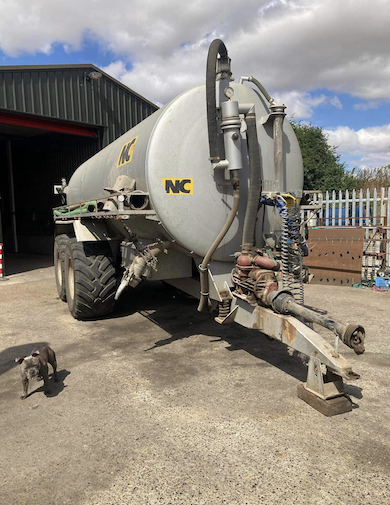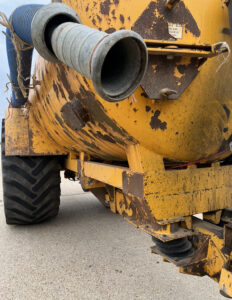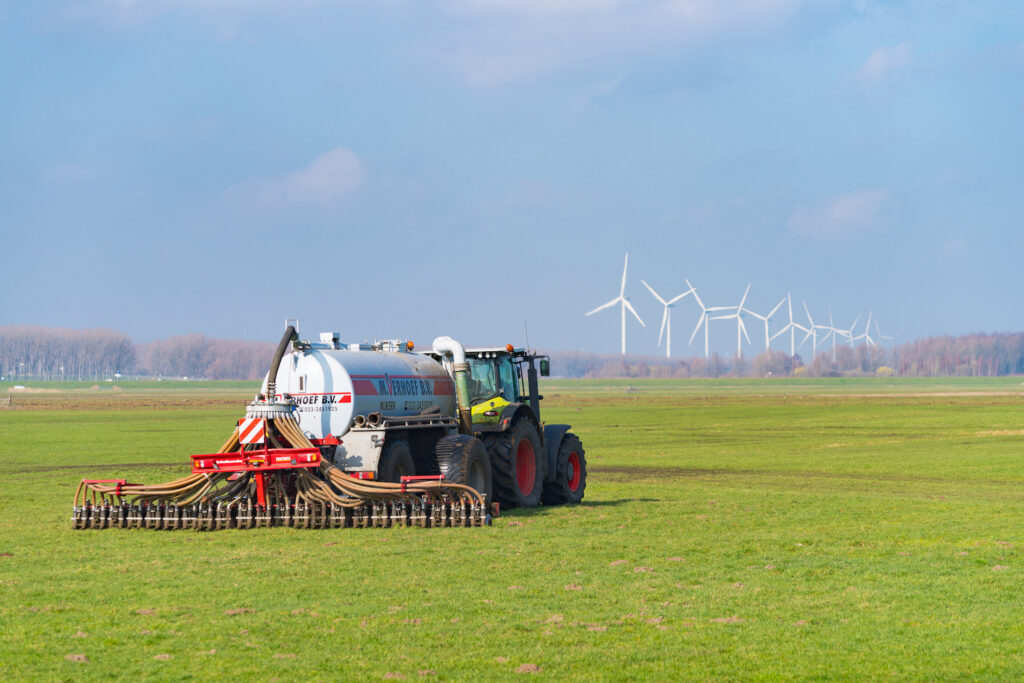Legal towing weights for slurry tankers – what is the limit?
21st September 2022
Current government regulations state that the upper weight limit for agricultural trailed items including slurry tankers is 18.29 tonnes – regardless of whether they have an implement on the back.
There is widespread confusion and misinformation in the industry regarding the legal towing weights for slurry tankers, a freelance sales professional specialising in slurry equipment told Farmers Guide. Many farmers and contractors are under the impression that if their tanker has an implement on the back (e.g. a dribble bar or trailing shoe), it’s classed as a ‘working machine’ and there’s no weight limit.
Such misinformation often leads to farmers overloading their machines and risking prosecution should they be stopped by the authorities.
Speaking to Farmers Guide about machine weight regulations and trailer safety, Jane Gurney from Tilly Pass commented: “In reality, nothing should be towed in an agricultural situation that weighs over 18.29t. That’s the law. And that means the weight of your machine as well.”
As outlined in the The Road Vehicles (Construction and Use) (Amendment) Regulations 2015, the combination weight limit of an agricultural tractor towing an agricultural trailer is 31t, where the trailer can weigh no more than 18.29t fully laden.
The above regulation increased the weight limit of tractor and trailer from 24.39t to 31t, allowing farmers to use tractors up to 6.61t heavier for towing heavy loads. It also enabled the transport of higher volumes of produce in a single journey, resulting in fewer journeys and reduced risk of incidents.
While the weight allowance for tractors increased in 2015, the maximum laden weight of trailers remained the same (18.29t). Farmers must note that weight cannot be transferred from the front onto the trailer/trailed item and the latter must always be under the designated weight limit.
There is often a mistaken belief in the farming industry that slurry tankers with implements are classified differently to trailers and are therefore not subject to weight restriction. However, the bottom line is that no trailed item can exceed the legal weight limit of 18.29t, regardless of classification.
Farmers should also bear in mind that the gross weight of their machines includes any items or accessories on that machine. For example, a dribble bar on a slurry tanker or a tool box on a tractor will also count towards the total gross weight of each machine. The unladen weight of vehicles and implements can be found in the owner manuals.
“It is the farmer and contractor’s responsibility to know how much their machine weighs,” Ms Gurney pointed out.

A typical slurry tanker. Image © Jane Gurney/Tilly Pass.
The consequences of non-compliance
Knowing and adhering to the correct weight limit for your tanker is paramount, as non-compliance can cost operators and businesses dearly. Depending on the amount of excess weight, penalties can include a fine, points on the operator’s licence, or a court summons for a serious offence. The type of penalty issued will be at the discretion of the officer who stops the vehicle.
A spokesperson for the DVSA, quoted by That’s Farming, said: “Normally, a fixed penalty would be inappropriate for serious cases of overloading.
“For example, when the vehicle is overloaded by 30% and over, or the excess weight is 5 tonnes, a court summons would be issued instead.
“If the excess weight and the way the load is carried is having a significant impact on road safety, for example, serious instability or loss of control, these other offences will mean a court summons. The excess weight would be part of the offence/s,” the spokesperson concluded.
Aside from prosecution, overloading an agricultural machine is also a major health and safety risk and should be avoided in all circumstances. Overloading can make a vehicle less stable, increase maintenance costs, reduce the operator’s control over the machine and even lead to fatal incidents.
Slurry tanker safety information
In order for their tanker to be adequately covered by insurance, Ms Gurney said farmers must make sure:
- It is well maintained and in good working order
- The tanker can break for itself
- All operators are suitably trained and have the correct license
- The tanker is being towed at the correct speed
- The tanker is not overfilled and is under the legal weight limit
- Daily and weekly checks are carried out.
For more information, visit NFU Mutual’s trailer insurance page.
A good way to ensure your tanker meets the standards set out in the PUWER 98 regulations is to book a Tilly Pass inspection, Ms Gurney adds. These are carried out by authorised mechanics across the UK, who will examine your tanker based on an 18-point check list. Upon successful completion, your tanker will be declared roadworthy and you will receive a Tilly certificate to go on the tailgate of your trailer.

A poorly maintained bowser. Image © Jane Gurney/Tilly Pass.
Ms Gurney also stressed the importance of reading manuals and making sure only manufacturers’ checks are carried out. The Tilly Pass Head to Tow App has various manuals available to read and download, with more manufacturers expected to join shortly.
She added: “It’s the employer’s ‘duty of care’ to make sure that they make time for the operator to check their machine themselves in the morning. You should never use a machine that someone else has checked. You must check it yourself. It’s your responsibility, and if you change your combination during the day, so you swap to tow something else, then you must make time to check that item.”
Ms Gurney explained that once an operator changes the combination, that trailed item may behave in a different way. Therefore, to avoid unnecessary accidents, it’s really important that everything is re-checked on the combination that is going to be towed with.
She emphasised that slurry tanker operators must ensure all accessories are secured correctly when driving on the road. If the bowser is carrying dribble bars on the back, these must be folded up with the slurry outlets closed to prevent any slurry from spilling onto the road.
Maintaining the cleanliness of the tanker is also important if farmers want their machine to perform as they expect it to, Ms Gurney says. Since slurry tankers often work in appalling conditions, washing them down, keeping wheels clean and greasing them up will help keep the machines operational.

